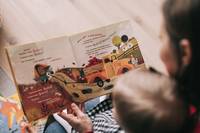
02 Oct Parents and Toddlers Both Try to Control the Screen When Reading Together on a Tablet
MedicalResearch.com Interview with:

Dr. Munzer
Tiffany G. Munzer, MD
Department of Pediatrics
University of Michigan Medical School
Ann Arbor
MedicalResearch.com: What is the background for this study?
Response: There’s been such a rise in the prevalence of tablet devices and the recommendation for families of young children has been to engage in media together because children learn the most from screens when they’re shared with an adult. However, little is known about how toddlers and adults might behave and interact using a tablet.
MedicalResearch.com: Can explain simply what you did and what you found?
- We invited parents and toddlers to the University of Michigan and had them engage over a tablet-based book with all the bells and whistles (sound effects, animation), a tablet-based book with page-turning capabilities, and a regular print book.
- In general, we found differences in nonverbal communication from both parents and children when engaging in the tablet:
- Children used the tablet books in a more solitary or independent fashion, which prevented parents from easily viewing or accessing the book, and made it harder for parents to communicate with their children.
- Children both engaged in more intrusive and controlling behaviors by pushing their parents’ hand away, moving the book away from their parents, and grabbing the book.
- Parents as a result also engaged in more of these behaviors by pushing their children’s hand away and moving the book away from their children.
- These behaviors may interfere with the back-and-forth engagement between parents and children (social reciprocity).
MedicalResearch.com: What should readers take away from your report?
- Response: The back and forth exchange (or social reciprocity) that happens between parents and children creates moments of joy, and is the foundation for child development. It is how children learn new words, gain emotional competence, and builds on their problem-solving abilities. Social reciprocity is how relationships are nurtured and is important for our future generation’s development and achievement. In this study, print books were great for promoting an environment that was rich with reciprocity, but the tablet appeared to create some conflict between parents and toddlers who were both trying to control the tablet.
- Though the American Academy of Pediatrics and other foundations recommend viewing screens together, it may be harder to achieve using a tablet. It is possible that the tablet is a highly-desired object by children. Alternatively, parents and toddlers intuitively know how to read with a book and are just not as used to interacting over a tablet together.
MedicalResearch.com: What recommendations do you have for future research as a result of this study?
- This study was conducted in a sample size of 37 participants, using a commercially-available app with relatively few distractions (compared to others that are available). Therefore, it would be important to repeat this study using different apps with more participants.
Any disclosures? This study was generously supported by the Academic Pediatric Association and Reach out and Read, and an NIH training grant. Dr. Radesky writes for PBS Kids and is on the board of directors of Melissa and Doug.
Citation:
Munzer TG, Miller AL, Weeks HM, Kaciroti N, Radesky J. Parent-Toddler Social Reciprocity During Reading From Electronic Tablets vs Print Books. JAMA Pediatr. Published online September 30, 2019. doi:10.1001/jamapediatrics.2019.3480
https://jamanetwork.com/journals/jamapediatrics/article-abstract/2751745
JOIN OUR EMAIL LIST
[mailpoet_form id="5"]We respect your privacy and will never share your details.
Last Modified: [last-modified]
The information on MedicalResearch.com is provided for educational purposes only, and is in no way intended to diagnose, cure, or treat any medical or other condition. Always seek the advice of your physician or other qualified health and ask your doctor any questions you may have regarding a medical condition. In addition to all other limitations and disclaimers in this agreement, service provider and its third party providers disclaim any liability or loss in connection with the content provided on this website.
Last Updated on October 2, 2019 by Marie Benz MD FAAD
